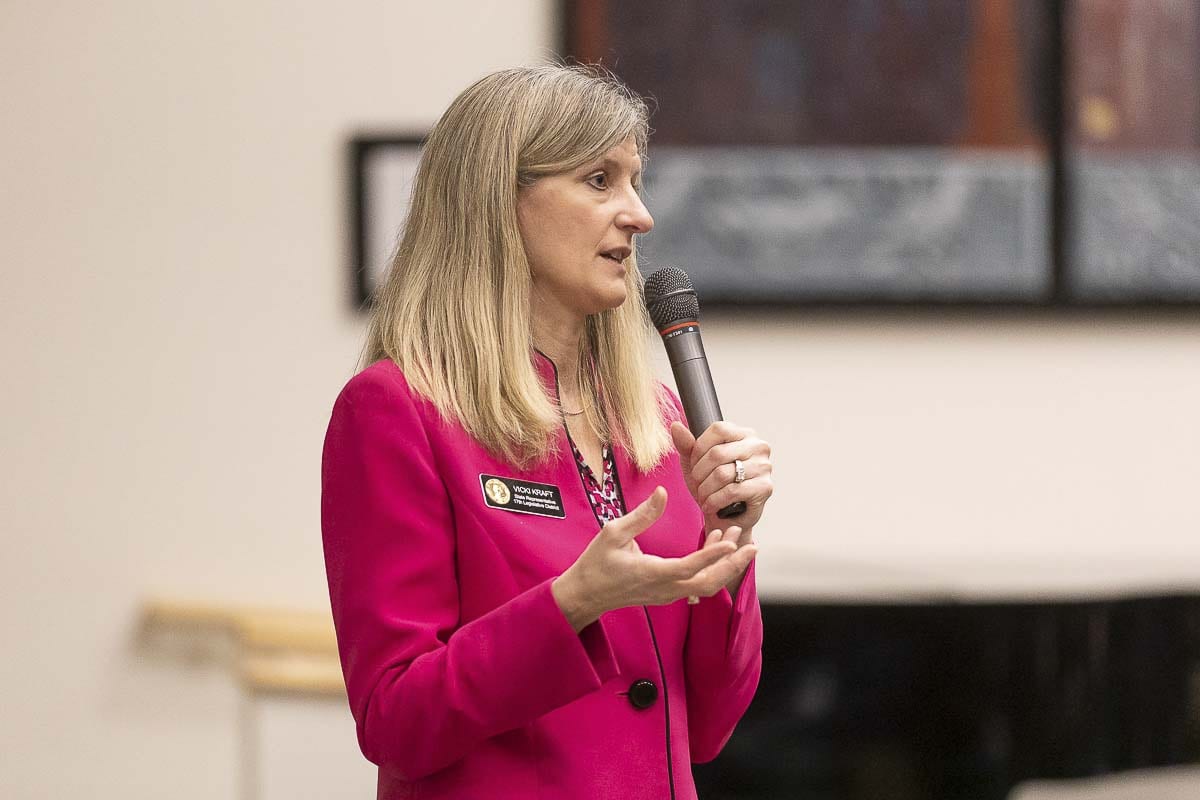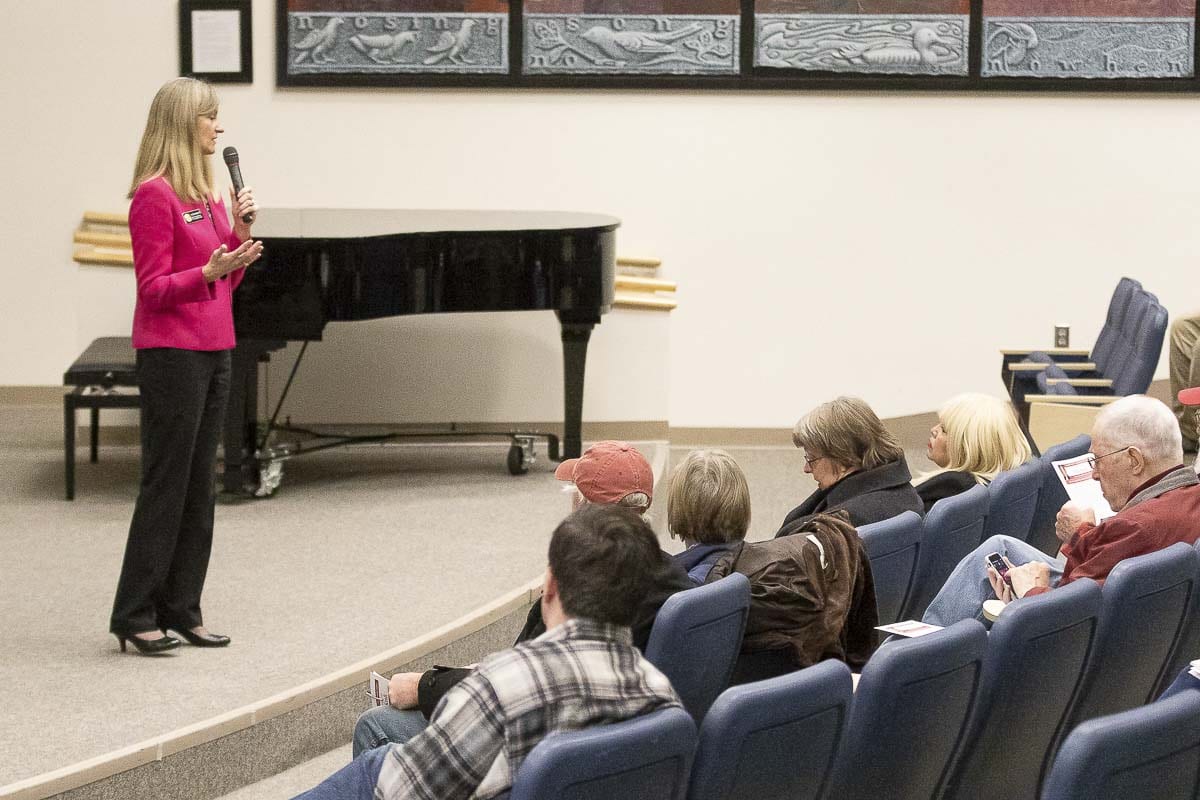The 17th District Republican talked taxes, sexual education, and more at WSU Vancouver
VANCOUVER — Members of the Washington State Legislature is kicking off their second week in Olympia as part of the short 60-day session. Rep. Vicki Kraft, of the 17th District, finished the first week by holding a town hall meeting at the Dengerink Administration Building on the Washington State University campus in front of around 50 people.

Now in her second term, Kraft is entering her third legislative session. This year, she was assigned to serve as a ranking minority member of the Local Government committee, as well as a member of the House Appropriations Committee and College and Workforce Development.
The house is under new leadership this session, with Rep. Laurie Jinkins (D-Tacoma) replacing Frank Chopp (D-Seattle), who stepped away from the top leadership spot after 21 years.
Jinkins also becomes the first female Speaker of the House, as well as the only openly lesbian state representative.
Kraft said she’s sure to find herself on the opposite end of the political spectrum from Jinkins more often than not, but Kraft did admit to being impressed that Jinkins reached out to every member of the House over the break, seeking to meet with them.
“I have a lot of respect for that,” said Kraft. “There’s 98 of us.”
Asked for one piece of advice she could share with the incoming speaker, Kraft said she thought for a bit and then responded, “treat others as you’d want to be treated.”
“And it gets a little more difficult when you’re in Olympia, because sometimes you may not like what somebody is doing or saying,” added Kraft, “and so you may not always treat them like you might want to be treated.”
One committee Kraft had to give up this year was Education, which she said she lobbied hard to remain on. They will be taking up two bills aimed at making Comprehensive Sexual Education (CSE) a requirement at schools across the state, something Kraft has been a vocal opponent of.
“When you start bypassing parents and their rights to decide what they want taught to their children or not, I mean, this isn’t math,” said Kraft. “This isn’t English. This is a topic that most of us blush about when we talk about with our kids in the room, let alone having somebody teach it to these children, and then they role play it?”
Kraft said she would prefer that school districts make information available to parents, and assist them in teaching many of the concepts available in the CSE curriculum, rather than forcing them to opt their children out if they don’t want them taking the classes.
After one parent commented that he had to wait until March for another chance to view the CSE curriculum being taught at his daughter’s school, after missing a one-day chance in October, Kraft drew a round of applause when she said any parent should be able to see what their child is being taught at any time.
“Those are your children. They’re not the government’s kids,” said Kraft. “I mean if OSPI (Office of Superintendent of Public Instruction) wants to make this available on their website and you as parents say ‘I want my students to be taught that,’ you can have the access and you can have that conversation.”
Kraft said that, despite reports showing CSE can reduce risks for teen pregnancy, sexually transmitted diseases, and suicidal tendencies for LGBTQ youth, many of the topics covered in the curriculum are too graphic for young minds, or can cause impressionable youth to question their sexual identities.
Other priorities
Outside of opposing mandatory CSE, Kraft said he is proposing legislation to increase the punishment for individuals convicted of buying or selling minors for sex. Under current law, a judge can levy a fine “up to” $5,000. Kraft’s bill would set a minimum standard, and prohibit fines from being waived, or reduced below the minimum amount.

Kraft also introduced legislation to require more detailed descriptions for an advisory vote, which happens after a new tax is passed. HB 2333 came about after one tax on the lumber industry showed up as an advisory vote on the most recent general election ballot — a bill Kraft had voted yes on. She said the bill actually reduced costs for the lumber industry overall, and was supported by the industry, but the description for the advisory vote on the ballot made it look only like she had voted for a new tax. Kraft’s bill would require the description to include financial implications of the tax be included as part of the advisory vote.
Another bill would allow for long-term antibiotic treatment for people with Lyme disease in Washington state. Current law prohibits long-term antibiotic treatment in the state, and this bill would allow it in certain cases, with the consent of the patient and their attending physician. Kraft said a meeting on the matter attracted dozens of people, many of whom had been battling the disease for decades and said they would fully support having the treatment option available.
Kraft also introduced HB 1738, which has the support of Rep. Brandon Vick in the 18th District, and would raise the Business and Opportunities (B&O) tax filing threshold to $35,000 for most businesses, or $56,000 for service industry businesses. Kraft said the bill helps to adjust the B&O tax threshold for inflation, and take some of the burden off of small businesses in the state.
“Essentially it would allow them to keep more of their money longer, and not have to pay it in taxes,” said Kraft. “They could reinvest, hopefully into their business, grow their business, grow jobs.”
Kraft said she is also interested in legislation to simplify regulations for businesses in the state.
“There’s like 25,000, rounding out, pages of regulatory code in law,” Kraft said. “I mean, who can keep up with this, seriously?”
Kraft’s bill would focus on agencies that interface most closely with businesses in the state, in hopes of changing the way they deal with businesses from more of a “punitive micro-management approach,” to more of a “good faith, guidance” approach.
“Meaning, if I come to your business, I’m going to start off with kind of that ‘innocent until proven guilty’ theory, and approach it from that vantage point,” said Kraft.
While Kraft doesn’t sit on the state Transportation Committee, or the bi-state group formed with Oregon to examine replacing the Interstate Bridge on I-5, she has introduced a bill hoping to put emphasis on pursuing a third crossing. The bill would put aside $300,000 for a study to look into areas for a potential third river crossing, and create a state of emergency for the project.
Kraft added that her colleagues on the bi-state bridge commission have yet to really set clear goals for their group, or what a new bridge project should look like, and what it should accomplish.
“If you do not determine what your primary objective is, what you build could totally miss the mark of what’s needed,” Kraft said she’d told her fellow lawmakers. “In my opinion, the traffic congestion has been the pain point. So that’s our number one objective is to relieve traffic congestion, and doing it without forcing you all into some mode of transportation, out of your vehicle, that you may not want to take.”
$30 car tabs
On Initiative 976, the $30 car tabs measure introduced by tax activist Tim Eyman and approved by voters in November, Kraft said lawmakers need to honor the will of the voters.
Addressing the legal challenges brought in King County that have held up implementation of the bill, Kraft said “it’s ridiculous. The voters have spoken.”

Kraft noted two democratic colleagues went so far during a legislative forum earlier this month to say that the will of the voters sometimes should be ignored.
“I thought, ‘you guys, really, don’t,’” said Kraft, adding that she has signed on to cosponsor a bill introduced by Rep. Jesse Young (R-Gig Harbor) that would implement the $30 car tabs immediately. HB 2227 has had a first reading and is now awaiting further action in the House Transportation Committee.
Education funding
Pressed by Evergreen School Board member Rob Perkins to address education funding and the possibility of impending budget cuts, Kraft said the state doesn’t have unlimited resources to help beleaguered districts.
“I’m going to ask you guys to do your best to prioritize and hold the line when negotiations come,” said Kraft. “When they (the teacher’s union) are trying to bully blood out of a stone, you’ve just got to say ‘no.’”
Kraft handed out flyers at the meeting outlining how much more funding local school districts have received after the passage of the McCleary legislation. Evergreen saw overall funding increase 19.5 percent between the 2016-17 school year and this one, with per pupil spending projected to exceed $13,000.
The districts point out that the legislature also made changes to the way employee benefits are funded, without providing additional funding, eating into local dollars. That, combined with teacher salary increases and the rising cost of doing business, they say, will have them facing potential staffing or program cutbacks in the next school year.




